Maverick Moments
These stories highlight students, faculty, staff, and/or events from Student Affairs Offices fostering big ideas and real-world thinking on campus and in the community.
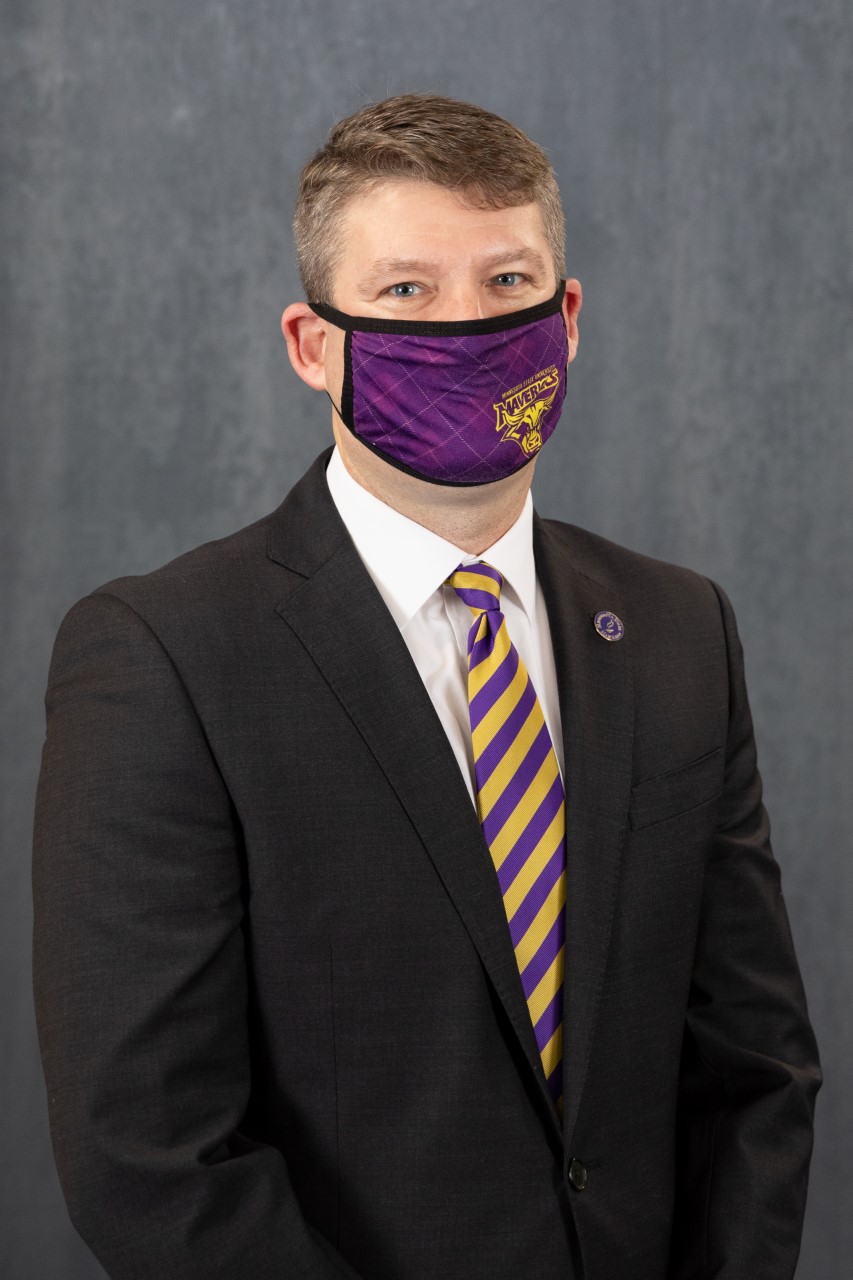
A Community of Scholars Making a World of Difference
The sun is setting across the remnants of our first snow of the season outside my office window as I write this to you. It is truly hard to believe we have arrived in December yet again. While the journey has been different this fall, the impact of your support and giving has never been greater. Let me share with you some of the great ways you have made a difference this past year.
Full Story + Show Less –The sun is setting across the remnants of our first snow of the season outside my office window as I write this to you. It is truly hard to believe we have arrived in December yet again. While the journey has been different this fall, the impact of your support and giving has never been greater. Let me share with you some of the great ways you have made a difference this past year.
Your support for scholarships has made the difference for so many or our Minnesota State University, Mankato students. Fall 2021 marked the third year of the Student Affairs Retention Scholarship and with your support we awarded three $1,000 scholarships to students who are becoming a pilot, studying psychology while fighting a rare kidney disease, and preparing to be a computer engineer as a first-generation immigrant from Nigeria. These three students are tremendous examples of the promise and challenges that many of our students are facing.
At a recent luncheon for our Presidential Scholars ($5,000 scholarship a year) I had the opportunity to join President Inch at a table with three upper-class students preparing for the end of their semester and for two of them, the beginning of life after college. The first December graduate will be starting her career at Federated Insurance in Owatonna, where she will be focused on debugging software. Our second December graduate will be working as an emergency department nurse at Mayo Clinic Health System’s Mankato Hospital. Our third Presidential Scholar is a junior with some time on his hands, but not much. You see he is a mechanical engineering major who is interested in working at a company where he can apply his knowledge to solve their engineering needs and help people. Of course, this sounds like every engineer I ever met. He then followed it up by sharing that he continues to drive to Madelia, MN almost every night because the local pizza restaurant is shorthanded, and he thinks it is important to help keep them afloat to serve the locals. The pandemic has created some new challenges for all of us, and it is exciting to see three students responding in their own ways to help others.
Throughout the fall, I am lucky to have the opportunity to spend time with many of you who stop by to visit at Homecoming, sporting events, or just traveling through. A recent visit from a long-time supporter and former faculty member from Colorado, and sometimes Alabama, stopped by to meet his scholar and spend some time with me to learn how things are just going. In the bustle of our daily work, home life, and concern for our own health, it was a welcome respite to share, learn, and laugh about our own challenges. I do not think we solved too many of the world’s problems, but the time together was an important reminder of what this University means to so many of us.
I choose to work at Minnesota State Mankato because I believe in our mission, the passion of our faculty, and the dedication of our staff to serve students who want to make a difference. My wife, Dr. Jennifer Jones a 1992 Alum, and I choose to give to this University because of the many students who need that little extra bit of support to help keep them on track toward their goals. From our premier Presidential Scholars to our students struggling with the balancing act of school and part-time work, we both know our gift makes a difference.
Thank you for all your support this year and please consider reaching out to me to ask how you can help. My best wishes to you and yours this holiday season. See you in 2022!
David P. Jones, Ph.D.
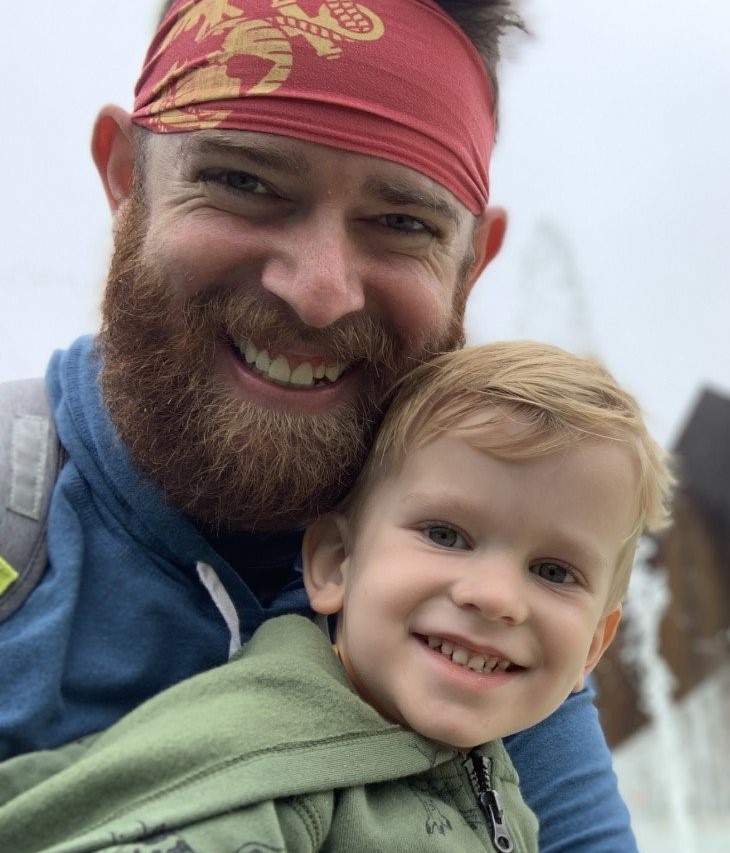
A Journey Through the Veterans Resource Center with Ben Pierce
If there was one word Ben Pierce would use to describe the Veterans Resource Center at Minnesota State University, Mankato it would be “fantastic.”
Full Story + Show Less –|
If there was one word Ben Pierce would use to describe the Veterans Resource Center at Minnesota State University, Mankato it would be “fantastic.” Located in room 167 of the Centennial Student Union, the Veterans Resource Center provides a safe space where students from all backgrounds can come together, make friends, share stories, and become a part of the Maverick community. Pierce is not the same as many traditional students. He joined the United States Marine Corps right out of high school at the age of 19. After nine years of service, his plan was to move out of Minnesota with his wife and attend college in Arizona. Unfortunately, five months before the beginning of fall semester, tragedy struck. Pierce’s six-month-old son Aiden (pictured above with Pierce) was diagnosed with cancer. In need of some extra support from his friends and family, Pierce and his wife decided to move back to Minnesota. “Thankfully, we caught the tumor super early, the surgery went well, and he’s been cancer free now for two and a half years,” he said. With a happy and healthy three-year-old and the support of his friends and family, 27-year-old Pierce decided it was time to take his career to the next step by earning his bachelor’s degree in law enforcement at Minnesota State University, Mankato. “I remember when I first got here, the Social and Behavioral Science departments were doing a little luncheon where students could go meet the faculty and get to know other students. I decided to go and was approached by the dean of SBS, Matthew Loayza, and Paul Mackie, who is a professor of Social Work,” said Pierce. “After having a conversation with them and them realizing that I was a veteran, Paul Mackie took me down to the Vet Center right away, and it’s just been a place I’ve spent time at ever since.” “A lot of veteran students are in some way struggling with their identities when they leave the military and transition into being a civilian,” Pierce adds. “For nine years, all I knew was the Marine Corps and how to be a Marine.” Pierce acknowledges that coming back to school has been challenging—but the Veterans Resource Center has been critical in helping him succeed. “Having that community helps you bridge that gap and helps you understand like yes, it’s okay,” he says. “To be a veteran is not weird, nor is it scary. There are people who will help you out, and there are a lot of opportunities to build that community with other veterans and to get the support that is needed.” One of his favorite things is that the Veterans Resource Center works to incorporate nonmilitary-affiliated students into activities. “Which is great, because it is important to bridge that gap between military and civilian,” Pierce stated. The Veterans Resource Center offers a wide variety of activities that are available for all students, such as the co-ed veterans softball team and movie nights twice a month. “It’s just a wonderful time getting to play and compete but also show that we are just like everybody else,” says Pierce. The Veterans Resource Center understands that this transition can be challenging for most if not all students. Having a safe space for veterans like Pierce to be vulnerable and allowing them to engage in each other's experiences promote diversity, inclusion, and academic success in the Maverick community. This year, Pierce led the co-ed veteran's softball team to the championship game, organized movie night and brought his son to march in the homecoming parade with other veteran students. With the support of his friends, family and the Veterans Center, Pierce will graduate from Minnesota State University, Mankato this fall with his bachelor’s in law enforcement. “My time here as a student would have been a lot more challenging without the veterans center,” he says. “You need some sort of social life and some sort of community to help balance out the demands of being a student.” |
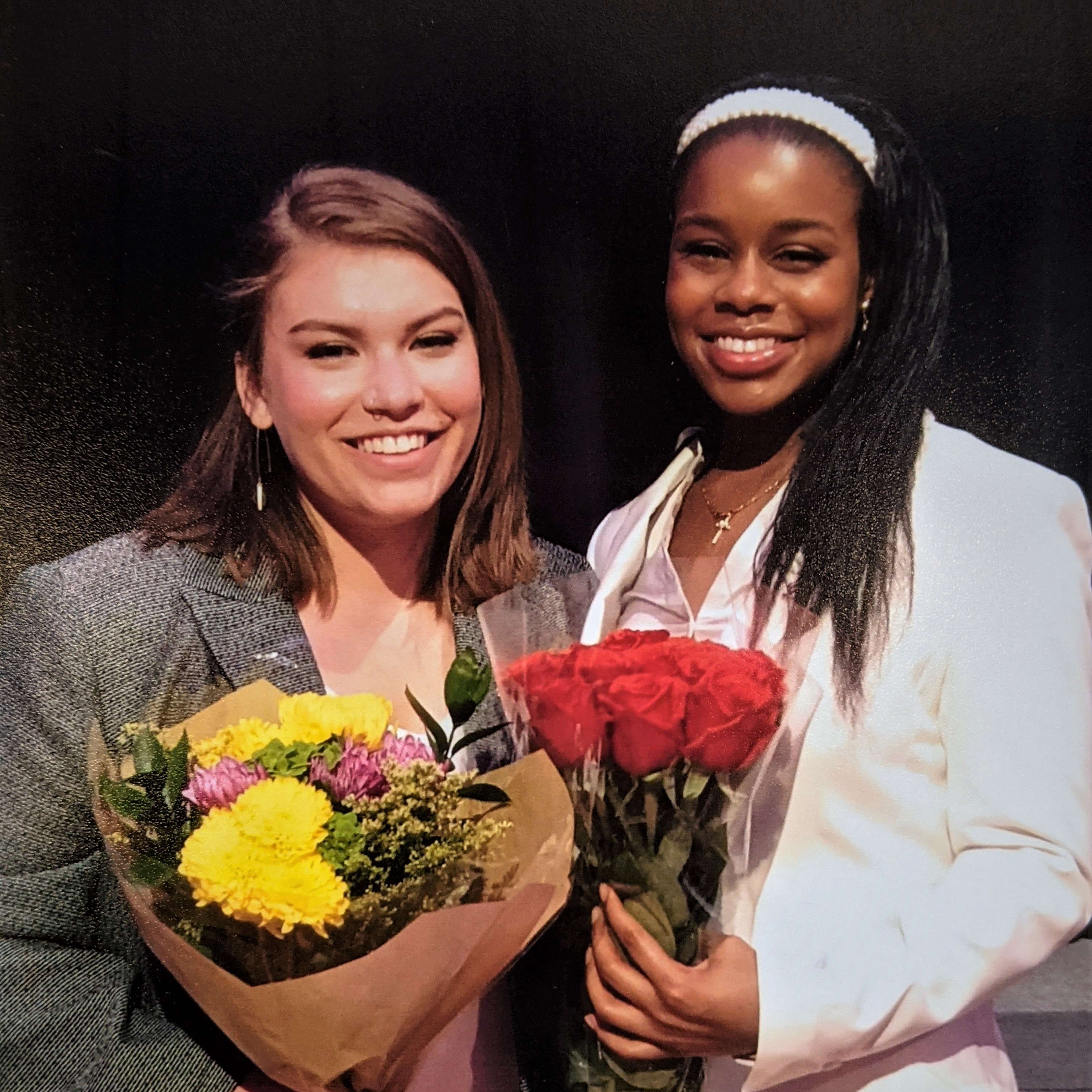
Back to Basics
Student Body President Reauna Stiff and Vice President Kara Svercl go above and beyond what it means to be a leader and advocate for students at Minnesota State University, Mankato.
Full Story + Show Less –Student Body President Reauna Stiff and Vice President Kara Svercl go above and beyond what it means to be a leader and advocate for students at Minnesota State University, Mankato. “The ability to make a real difference on campus is something that I want to do as a person, a student, and as a social work major in preparing for my future career,” says Svercl.
Hardworking and determined leaders, Stiff and Svercl share a passion for student advocacy. Stiff fought social justice issues in high school and continues to do so as a senior here at Minnesota State University, Mankato. In the future, Stiff wants to pursue a career as a civil rights attorney who represents society’s most vulnerable and disenfranchised. Svercl has been an advocate for students with food insecurities and was able to bring a program called Swipe Out Hunger, which provides donated dining hall meals to over 300 needy students. Svercl is a junior here at Minnesota State, Mankato working on her social work and child development degree in hopes to help as many people as she can.
Both Stiff and Svercl have been working tirelessly on a campaign called Back to Basics. As student government leaders, their mission is to ensure students have the basics such as food, water, clothing, and a safe place to live in order to succeed. They have identified three areas of focus this coming year.
The first project is creating an off-campus housing website that is student-centered and student-led. In addition to having a website with pictures, lists, of amenities, and other information to help make a rental decision. They hope to provide a rating system that allows students to rate the cleanliness, security, and responsiveness of off- campus housing rental properties.
The second project Stiff and Svercl are working hard to finish is creating a student basic needs hub. Building off the momentum of the Maverick Food Pantry. Even though the Maverick Food Pantry has been a huge success in terms of feeding students, it is running out of space due to the max number of students who need food. Therefore, the idea behind this project is to expand it into a hub where students not only get food but also have access to case manager service.
“We know where there is food insecurity, there is strong correlations between lack of transportation, house insecurity, medical needs, or mental health needs,” Svercl stated. “Usually, food insecurity is a symptom to a much larger problem.”
Both Stiff and Svercl want to go into this idea with a holistic approach that will tackle every aspect of a student’s life in order to ensure their success on and off campus here at Minnesota State University, Mankato.
The third and final project for this Back to Basics campaign is the Student Room and Board Support Fund. Which will establish scholarships for students with the highest need to cover a portion of the room and meal plan on campus.
Stiff and Svercl’s passion for the students here at Minnesota State University, Mankato is impeccable. Their Back to Basics campaign offers real life ideas that have and will continue to impact many students lives in a very positive way.
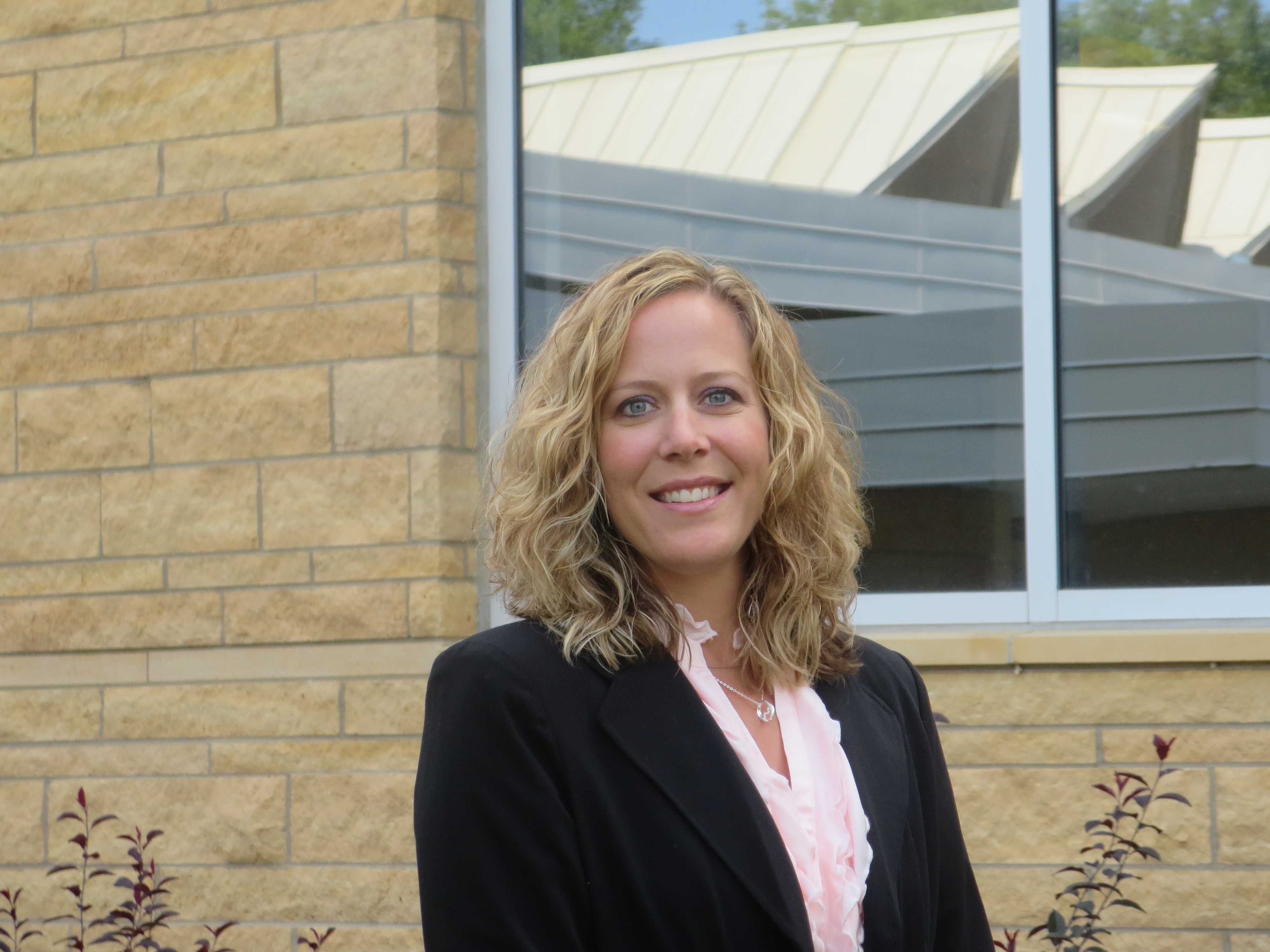
Unprecedented Creativity
Exactly one year ago, our lives were completely changed as COVID-19 was declared a national pandemic by the World Health Organization (WHO). With the unprecedented times came a need for unprecedented creativity to continue providing access to campus resources for students. Although campus closed, Student Health Services found a way to accommodate student needs.
Full Story + Show Less –Exactly one year ago, our lives were completely changed as COVID-19 was declared a national pandemic by the World Health Organization (WHO). With the unprecedented times came a need for unprecedented creativity to continue providing access to campus resources for students. Although campus closed, Student Health Services found a way to accommodate student needs.
At the time, most of the University was closing, and Student Health Services worked to do what it could to continue to serve students. Dr. Wendy Schuh, director of Student Health Services, now acknowledges, “We had many long, difficult conversations about that…. and did not know nearly as much as we know now. We decided that it’d be important to stay open but needed to do things like separate our well visits from anyone who had COVID symptoms and reconfigure our space to allow for social distancing.”
Student Health Services worked closely with Residential Life and Environmental Health and Safety to find a safe space to open an upper clinic, in Carkoski Commons, to see students and begin testing those with COVID-19 symptoms. A space that once housed administrative offices was renovated; they brought in exam tables, installed a sink, calculated air circulation times needed between testing appointments and were able to get the clinic up and running before students returned to campus for the Fall 2020 semester.
In addition to the upper clinic, Student Health Services found a variety of ways to alter services to meet student needs. Despite low numbers of students living on campus, the clinic still saw more than 3,200 students for more than 7,700 medical visits in 2020.
“Some students need that continuity of care to meet their healthcare needs,” Schuh said.
The different functional areas of Student Health Services worked collaboratively to adjust services to continue to meet student needs. The Medical Clinic remained open for in-person visits but also began offering more virtual appointments through Zoom Health, a HIPAA-compliant meeting tool. The clinic also enabled a secure message feature on Medicat, its medical record system, to provide more open communication between students and providers.
Additionally, a healthcare hotline (507-389-5591) was created and staffed by a nurse or medical provider every weekday from 8 a.m. to 4 p.m. to answer students’ questions about symptoms, testing, isolation and quarantine. They also hired a graduate intern to meet with students, some of whom had never been on campus because of COVID, and connect them with campus resources to aid in their success.
Furthermore, the Pharmacy began sending mail order prescriptions and over-the-counter supplies to students for the first time. Telepsychiatry partners through the Minnesota State Collaborative Partnership were offered this same service to meet the needs of students struggling at other Minnesota State campuses too.
The Office of Student Affairs hired a COVID Case Manager housed in Health Education to help track COVID cases related to the University and serve as a liaison to the Minnesota Department of Health (MDH). Additionally, alcohol and drug sanction education programs moved online to keep students and staff safe, and the Student Health PROs continued to meet virtually to find creative ways to carry on programming and messaging around campus.
As Minnesota State University, Mankato looks to the future and to the realities of a post-COVID society, the University also has to consider what changes to keep. COVID has demonstrated semester after semester just how important Student Health Services is and how lucky the campus is to have such a valuable resource for students.
Even when students come back to campus, online resources will still serve as a way to increase access to services.
“I don’t think telehealth is going anywhere.” Schuh says. “Most people prefer to see their provider in person; it’s just natural to have that in-person relationship. But telehealth can address barriers such as students being out of town, going home for the semester or being under isolation or quarantine. Technology is a vehicle to help us care for our students, which has really pushed us to the next level.”
As the long-term effects of COVID linger on campus, Student Health Services will continue to meet students’ physical and mental needs while they plan for a free-standing, comprehensive facility to expand services within the next 10 years.
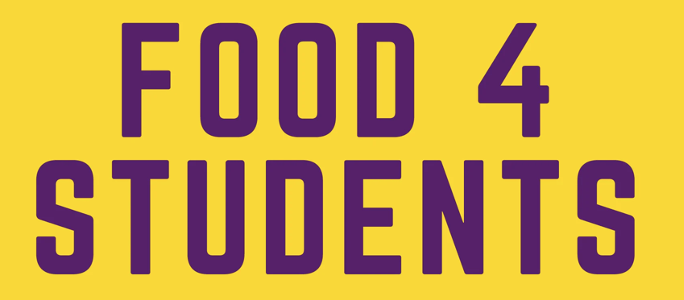
A Long-Standing Commitment to Student Success
“Addressing food insecurity on campus is a key part in retaining students and helping them be successful when they’re in school,” Svercl says. “What the research points to is that students who are food insecure are often working more hours per week than students who aren’t food insecure, meaning it’s not a lack of effort or a lack of desire to work, but rather there are so many cards stacked against [them]. As the cost of college increases, and now with the pandemic making everything more strained, it becomes more and more difficult than in generations past to maintain and pay for college while also paying for basic needs and finding that consistent balance.”
Full Story + Show Less –In Spring 2018, Carol Glasser, Associate Professor in the Sociology department, taught a Sociology in Action course. She and her students researched food insecurity amongst Minnesota State University, Mankato students. A self-administered, anonymous, online survey was approved by the Office of Research and Sponsored Programs and sent to a random sample of 2,100 students that met the criteria of being undergraduate and full-time students who were enrolled in Spring 2018.
They found that more Minnesota State Mankato students experience food insecurity than the national average. Only 36 percent of students surveyed were food secure, while 40 percent of students experienced high or very high food insecurity. Another 24 percentage of students were experiencing marginal food insecurity issues. Therefore, almost two-thirds of the participating students were experiencing some level of food insecurity.
Students can be considered food insecure if in the last 30 days they experienced the inability to buy groceries, inability to afford balanced meals, cut the size of meals to make groceries last longer, didn’t eat even though they were hungry, lost weight caused by a lack of food availability or didn’t eat for a full day.
As a result of this study, many students, faculty, staff and administrators have been working hard to address issues of food insecurity for students and raise attention to the problem among others on campus and in the community. Kara Svercl, a second-year Social Work major, discovered food insecurity was a large problem last year when she served as a senator in Student Government.
“Addressing food insecurity on campus is a key part in retaining students and helping them be successful when they’re in school,” Svercl says. “What the research points to is that students who are food insecure are often working more hours per week than students who aren’t food insecure, meaning it’s not a lack of effort or a lack of desire to work, but rather there are so many cards stacked against [them]. As the cost of college increases, and now with the pandemic making everything more strained, it becomes more and more difficult than in generations past to maintain and pay for college while also paying for basic needs and finding that consistent balance.”
Svercl found a program called Swipe Out Hunger that works with colleges and universities to implement and amplify a range of anti-hunger programs across campus networks. These programs are sustainable, student-centric, innovative and destigmatizing, to provide students with the resources they need.
In Fall 2020, her hard work paid off when the program was brought to campus. Sodexo, the University’s food services and facilities management company, even donated almost 5,000 meal swipes to get the program off the ground. As the program progresses, students will be able to donate their unused meal swipes for other students to use, without any extra costs.
Students apply for these swipes through a low-barrier online application. When awarded, these meal swipes are loaded onto a student ID, just like dining dollars, so students can eat in the dining facilities on campus without anyone knowing they are using the program. It can restore that sense of just being a student without having the additional stressors caused by food insecurity.
There was an overwhelming response to the program in its first semester, when 387 students were served. In addition to receiving meal swipes, students are referred to a staff member who serves as a case manager role and then follows up with other resources that aid in student hunger.
One of those resources is the newly initiated Maverick Food Pantry. For years, various offices and organizations, including Student Government, Diversity & Inclusion, the Kearney Center for International Student Services and Residential Life, have been working together to open a food pantry on campus. The pantry is even more important now as students are unable to maintain steady work and income as a result of the COVID-19 pandemic.
Located in Carkoski Commons 142, the Maverick Food Pantry is open on Mondays, Wednesdays and Fridays at varying times to provide easy access to students. Any student is able to utilize the resource once a week to obtain a prepackaged box with canned goods, pasta or rice, canned meat, cereal, snacks, butter, milk, eggs, cheese, bread and a fresh meat option. Household and personal care items are also available as needed, including can openers, feminine hygiene products, toothbrushes and toothpaste.
“We are doing everything we can to make it a safe, warm and inviting experience,” says Megan Heutmaker, who is overseeing operations. “We are over in Carkoski, which is kind of tucked away in a corner… so it’s not super obvious what’s going on, but you can see where we are. We try to make the process as quick as possible as well.”
Although neither of these programs can fix the larger issue of food insecurity, they are both working hard to eliminate the stigma surrounding it and serve as contact points to meet the immediate needs of students. As a campus, Minnesota State Mankato has a long-standing commitment to serving the community and focusing on student success. Swipe Out Hunger and the Maverick Food Pantry are prime examples of responsive actions that focus on helping our students succeed.
To support the Maverick Food Pantry, click here.

